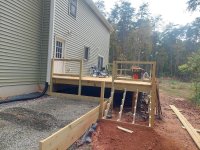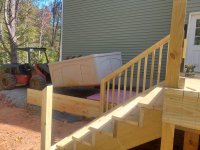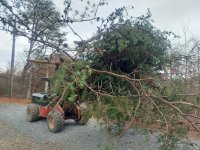You are using an out of date browser. It may not display this or other websites correctly.
You should upgrade or use an alternative browser.
You should upgrade or use an alternative browser.
What did you do with your Power Trac today?
- Thread starter m5040
- Start date
- Views: 78279
More options
Who Replied?
/ What did you do with your Power Trac today?
#401
PowerTracManiac
Silver Member
PT1460 makes for a great car/truck mover.
Have this box truck that I use to store a bunch of stuff in. Needed to move it out of the way for some tree cutting. Box truck is packed with metal tube and is very heavy. Of course, it doesn't run right now.
PT to the rescue. Used a tire over the PT mounting plate and a chain just for safety and the PT pushed the box truck to where I needed it in a controlled, safe way with no damage.
Have a great football weekend everyone!
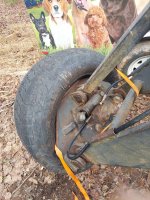
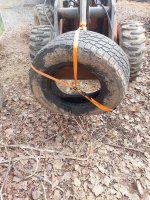
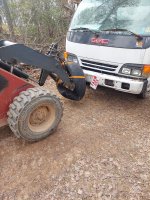
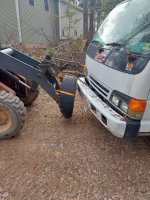
Have this box truck that I use to store a bunch of stuff in. Needed to move it out of the way for some tree cutting. Box truck is packed with metal tube and is very heavy. Of course, it doesn't run right now.
PT to the rescue. Used a tire over the PT mounting plate and a chain just for safety and the PT pushed the box truck to where I needed it in a controlled, safe way with no damage.
Have a great football weekend everyone!




m5040
Veteran Member
- Joined
- Nov 23, 2008
- Messages
- 1,015
- Location
- CT
- Tractor
- Kubota M6040 L2250, JohnDeere 310D, Ford 841 Elenco, Ford 961, Trapmaster, PT180 w/LM bucket and 45" brush cutter, PT1430 Deutz w/grapple bucket, Antonio Carraro Tigrecar 6500. John Deere 5300. Former owned Steiner 430 max, Goldoni REV Maxter 7
Good job! The 1460 is a beast
- Joined
- Aug 31, 2001
- Messages
- 66,099
- Location
- South Bend, Indiana (near)
- Tractor
- Power Trac PT425 2001 Model Year
I've done identical with my PT425 and dead vehicles in my driveway!PT1460 makes for a great car/truck mover.
Have this box truck that I use to store a bunch of stuff in. Needed to move it out of the way for some tree cutting. Box truck is packed with metal tube and is very heavy. Of course, it doesn't run right now.
PT to the rescue. Used a tire over the PT mounting plate and a chain just for safety and the PT pushed the box truck to where I needed it in a controlled, safe way with no damage.
Have a great football weekend everyone!
View attachment 851456
View attachment 851457
View attachment 851459
View attachment 851461
Another good reason to keep an old tire around.
PowerTracManiac
Silver Member
- Joined
- Aug 31, 2001
- Messages
- 66,099
- Location
- South Bend, Indiana (near)
- Tractor
- Power Trac PT425 2001 Model Year
This wasn't today, it was a couple summers ago doing the garage addition. There's always been a question on the lifting capacity of the PT425. It lists 800#. Here's a picture of mine with the large bucket and 12 sixty pound bags of concrete, so that's about 720# of material plus the bucket out past the QA plate, so that should settle that, at least in my mind. 

ponytug
Super Member
Yea, I think that the PT estimates are conservative, at least for the 1445. I wonder if they are the maximum load at full turn.
Out yesterday, getting ready for a big storm, and replacing sections of some WWII drainage pipe with some new PVC pipe;

The great thing about PTs is the articulation. Those are 18' and 20' pieces of 6" heavy wall pipe on the forks. That's an 8' gate, followed by a seven foot wide space between the electric fence and the pump house.
Piece of cake, and no schlepping pipe.
In case you are wondering why 300psi PVC high pressure water pipe is being used for drainage, the pipes were part of a truckload size lot from an auction of assorted pipe, for less than the price of a single piece of 2" PVC. If the cows kick it, nothing is going to happen. Total overkill, no question.
The day before, I was catching up on some chipping of branches from fire trimming with the PT. Wow, the new blades make the chipper practically a completely different machine. Everything feeds better, and the thin twigs that used go through without being chipped are nicely chopped now. (The replacement blades are the WoodMax US made blades, and they are so, so, much better than the Chinese originals. The US blades aren't cheap, but are definitely way, way better.)
All the best,
Peter
Out yesterday, getting ready for a big storm, and replacing sections of some WWII drainage pipe with some new PVC pipe;
The great thing about PTs is the articulation. Those are 18' and 20' pieces of 6" heavy wall pipe on the forks. That's an 8' gate, followed by a seven foot wide space between the electric fence and the pump house.
Piece of cake, and no schlepping pipe.
In case you are wondering why 300psi PVC high pressure water pipe is being used for drainage, the pipes were part of a truckload size lot from an auction of assorted pipe, for less than the price of a single piece of 2" PVC. If the cows kick it, nothing is going to happen. Total overkill, no question.
The day before, I was catching up on some chipping of branches from fire trimming with the PT. Wow, the new blades make the chipper practically a completely different machine. Everything feeds better, and the thin twigs that used go through without being chipped are nicely chopped now. (The replacement blades are the WoodMax US made blades, and they are so, so, much better than the Chinese originals. The US blades aren't cheap, but are definitely way, way better.)
All the best,
Peter
- Joined
- Aug 31, 2001
- Messages
- 66,099
- Location
- South Bend, Indiana (near)
- Tractor
- Power Trac PT425 2001 Model Year
Last spring I picked up a dead 8hp chipper/shredder/vac/blower at the scrap yard for $20. The engine is dead and not worth repairing. I was thinking of adding a Harbor Freight replacement engine like I did with my log splitter, but I'm leaning more towards a hydraulic motor with lovejoy connector. I'm gonna disassemble it over the winter as time permits and check the bearings and such. I think I'm gonna mount it with the ground level discharge facing forward, and making a plate that can rotate 90 degrees to direct the blower left or right. I'd make it removable for chipping. It will be good for garden debris.
- Joined
- Aug 31, 2001
- Messages
- 66,099
- Location
- South Bend, Indiana (near)
- Tractor
- Power Trac PT425 2001 Model Year
Dug out my canna lilies a couple nights ago. We've got about 40' of fence along the pool where I plant three rows of them staggered every spring. Usually plant a couple hundred. Have to dig them out in fall or they die. Can't be frozen. The strip is about 2' wide that I till every spring. So we cut them down after first frost kill, and I used the large bucket to just scoop them out, back up, and dump them out of the trench. Then I walk down the trench and toss the tubers into the bucket after shaking off the dirts. Only took about 25 minutes. Nice having the machine back and running again.
However!!!! I saw oil all over the right footwell. Grrrr. Investigation revealed one of the small hoses exiting through the front to the FEL area had a loose fitting. Tightened it up and all good except for the oil cleanup. I'll have to go through all the fittings now. First time it over 1000 hours that has happened.
However!!!! I saw oil all over the right footwell. Grrrr. Investigation revealed one of the small hoses exiting through the front to the FEL area had a loose fitting. Tightened it up and all good except for the oil cleanup. I'll have to go through all the fittings now. First time it over 1000 hours that has happened.
ponytug
Super Member
FWIW: I used a splined PTO hydraulic motor from Surplus Central, and a PTO drive coupler that is a heavy duty version of a LoveJoy coupler, which has a 3/4" disc of fiber reinforced rubber bolted with six bolts, three to each shaft. I think that mine is a part of a Landpride dual brush hog (it was cheap).Last spring I picked up a dead 8hp chipper/shredder/vac/blower at the scrap yard for $20. The engine is dead and not worth repairing. I was thinking of adding a Harbor Freight replacement engine like I did with my log splitter, but I'm leaning more towards a hydraulic motor with lovejoy connector. I'm gonna disassemble it over the winter as time permits and check the bearings and such. I think I'm gonna mount it with the ground level discharge facing forward, and making a plate that can rotate 90 degrees to direct the blower left or right. I'd make it removable for chipping. It will be good for garden debris.
Lovejoy couplers aren't great with impacts in my experience. A V-belts work pretty well to absorb impact and vibration.
All the best,
Peter
CreativeGuy
Bronze Member
I mounted a quick attach plate to the side of this hydraulic wood splitter (instead of 3 point attachment on the end). It’s great to be able to drive right up to where the wood I’d cut down.

- Joined
- Aug 31, 2001
- Messages
- 66,099
- Location
- South Bend, Indiana (near)
- Tractor
- Power Trac PT425 2001 Model Year
I'll take that under advisement. Thanks!FWIW: I used a splined PTO hydraulic motor from Surplus Central, and a PTO drive coupler that is a heavy duty version of a LoveJoy coupler, which has a 3/4" disc of fiber reinforced rubber bolted with six bolts, three to each shaft. I think that mine is a part of a Landpride dual brush hog (it was cheap).
Lovejoy couplers aren't great with impacts in my experience. A V-belts work pretty well to absorb impact and vibration.
All the best,
Peter
- Joined
- Aug 31, 2001
- Messages
- 66,099
- Location
- South Bend, Indiana (near)
- Tractor
- Power Trac PT425 2001 Model Year
I thought about converting the log splitter from gas to hydraulic when the original engine started leaking from seals and such, but I need the PT425 to bring the large rounds up to the splitter sometimes. So $99 Harbor freight engine took care of that. Exact replacement.I mounted a quick attach plate to the side of this hydraulic wood splitter (instead of 3 point attachment on the end). It’s great to be able to drive right up to where the wood I’d cut down.
View attachment 1870522
I do use the spare Q/A plate with receiver ball hitch to move the splitter around the yard, though. Very handy!
- Joined
- Aug 31, 2001
- Messages
- 66,099
- Location
- South Bend, Indiana (near)
- Tractor
- Power Trac PT425 2001 Model Year
Just noticed my water level leaning against the original garage back door. That thing has come in handy so many times. I think I have about 100' of clear tubing. I fill it with water that I add some green food coloring to. I got the slab set to within 1/8" all the way around. Not bad.This wasn't today, it was a couple summers ago doing the garage addition. There's always been a question on the lifting capacity of the PT425. It lists 800#. Here's a picture of mine with the large bucket and 12 sixty pound bags of concrete, so that's about 720# of material plus the bucket out past the QA plate, so that should settle that, at least in my mind.
View attachment 1870481
